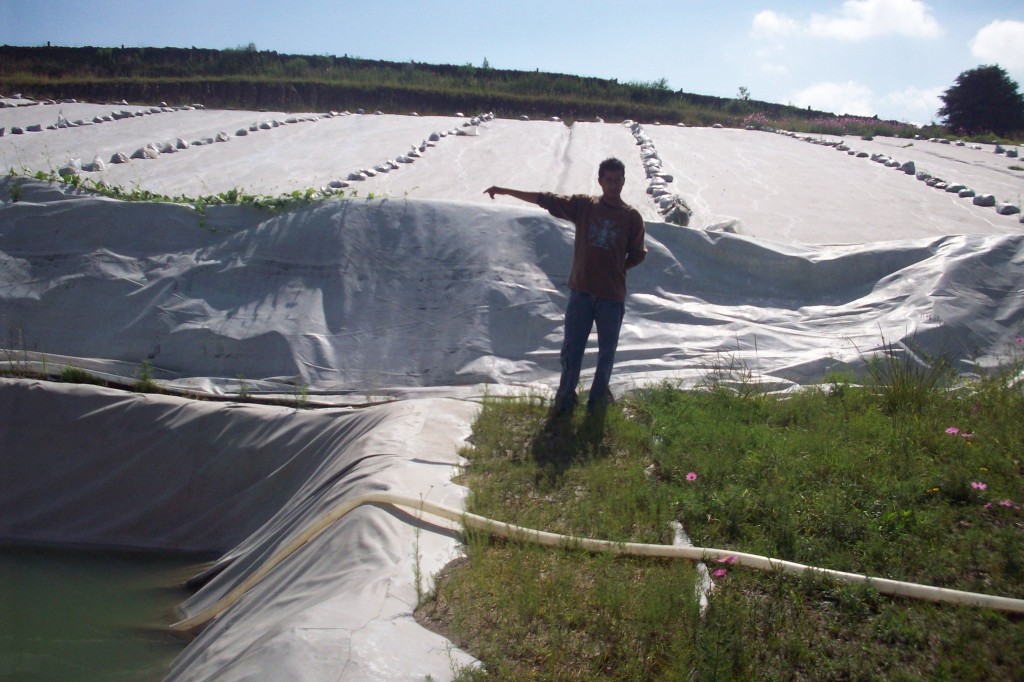Communities Should Go to Court Over Water | Inicio Agua comunitaria pasa por los tribunales
By Emilio Godoy
IPS
English | Spanish
Mexico City – Local communities in Latin America should go to court more often to fight for access to drinking water, regarded as a universal right, and combine legal action with social protests and political lobbying, experts say.
“People have already realised that legal action can be used as a last resort, because judges are less tainted by politicisation,”
said Javier Gonzaga, a member of the Environmental Conflicts Observatory at the state University of Caldas in Colombia.
“Courts are accepting lawsuits related to water rights, and legal confirmation makes those water rights enforceable,”
Gonzaga told IPS during a break in the Third Annual Meeting of the WATERLAT network, made up of researchers in Latin America and the Caribbean studying governance and citizenship in water management and environmental health.
Mexico provides a precedent, as in September a federal court ruled in favour of a resident in the community of Xochitepec in the central state of Morelos, about 100 km south of Mexico City, that had been without water services since the 1980s.
As a result, 100 poor families were able to get access to water in an area where luxury homes exist side by side with waterless neighbourhoods.
“Our first goal was fulfilled, because we wanted to have a judge recognise the right to water,”
María Emanuelli, the delegate from the regional office of the Habitat International Coalition (HIC), told IPS. She was attending the Oct. 24-26 meeting in Mexico City on “the struggle against water inequality and injustice in Latin America and the Caribbean.”
“It is one approach that can be used, although not the only one,” she said.
Last year the United Nations General Assembly approved a resolution recognising access to water as a basic human right, which was made binding a month later by the Human Rights Council. Member countries must reform their legislation to be in compliance.
Thirty-four countries in the Americas committed themselves to legislate in accordance with the principles of the declaration.
By 2020, over half the region should have reduced inequality in access to drinking water and doubled the proportion of water that is treated.
Countries like Argentina, Bolivia, Ecuador and Uruguay have already incorporated the universal right of access to water in their constitutions, as well as amendments declaring water resources to be a public good.
“The water crisis is social, political and institutional in nature, not about scarcity or appropriate technology,”
the coordinator of WATERLAT, Esteban Castro, told IPS.
“The overall trend in water conflicts is towards demanding water governance and management,”
said Castro, a professor in the School of Geography, Politics and Sociology at Newcastle University in the U.K.
In Mexico, 30 percent of households lack piped drinking water, and a further 15 percent are supplied with potable water every three days by other means, according to the National Institute of Statistics and Geography.
In Uruguay, by contrast, there is almost universal access to drinking water, which is enjoyed by 98 percent of the country’s 3.3 million people, according to official figures. And in Ecuador, water is supplied to 96 percent of the urban population and 74 percent of people living in rural areas.
In the southeastern Mexican state of Veracruz, people in eight municipalities have organised a Committee called “Defensa Verde, Naturaleza para Siempre” (Green Defence, Nature Forever) to oppose the construction of the El Naranjal hydroelectric complex, which would involve diverting the Blanco river. The power station is designed to generate between 305 and 360 megawatts, making it the ninth largest in the country.
“The complex would reduce the flow of water in the river by 92 percent,”
Beatriz Torres of the University of Veracruz, which supports the Committee, told IPS.
“People are afraid about flooding, the possible break-up of communities and the availability of water,”
she said after participating in the Mexico City meeting.
A 1948 decree banned concessions for water use in the Blanco river basin, but this was repealed by the national government in 2006 in order to make way for projects like El Naranjal.
Local people opposing these projects, who are mainly coffee and sugarcane farmers, are hoping to be as successful as the communities affected by the La Parota dam in the southern state of Guerrero, whose protests have managed to block work on the dam since 2009.
The warnings by environmentalists and academics are particularly important because at least seven hydroelectric projects in Mexico are facing local opposition.
“A combination of different strategies, social protests, lawsuits and political action is needed. Demanding a constitutional reform is important,” said Gonzaga.
The Mexican Congress rejected a proposal for a referendum to guarantee the right to water.
But a proposal for a constitutional amendment on water rights is pending in Mexico, as well as a reform of the 1992 National Water Law.
“The Water Law should be modified in a year’s time. We hope the spirit of the U.N. declaration (that water is a human right) will permeate the new law,” said Emanuelli.
WATERLAT’s Castro criticised the construction of large infrastructure works that jeopardise people’s right to water.
“The present conflicts are to protect water from pollution, to protest against the imposition of large construction projects and against insufficient protection against risks, and to defend water resources as a common good,” he said.
Source: IPS
Por Emilio Godoy
IPS
inglés | español
MÉXICO – Las comunidades latinoamericanas deben recurrir aun más a los tribunales para pugnar por el acceso al agua potable, considerado un derecho universal, combinando esa acción con la movilización social y el reclamo político, alientan expertos.
Credito:Emilio Godoy/IPS
Ya “se han dado cuenta de que el tema jurídico puede ser usado como un último eslabón, porque los jueces no están tan contaminados por la parte política”,
explicó Javier Gonzaga, miembro del Observatorio de Conflictos Ambientales de la estatal Universidad de Caldas, de Colombia.
“Los tribunales están aceptando demandas relacionadas con el derecho al agua, y el derecho crea la exigibilidad”,
agregó Gonzaga, quien conversó con IPS en un alto de la Tercera Reunión Anual de la Red Waterlat, formada por académicos de América Latina y el Caribe para investigar temas de gobernabilidad, ciudadanía en gestión hídrica y salud ambiental.
México puede erguirse como antecedente, pues un tribunal federal amparó en septiembre a una residente de la comunidad de Xochitepec, en el central estado de Morelos y unos 100 kilómetros al sur de la ciudad de México, que no contaba con el servicio de agua desde los años 80.
De esa forma, 100 familias pobres pudieron acceder al recurso en una zona donde conviven residencias de lujo con barrios carentes del líquido.
“Nuestro objetivo inicial se cumplió, porque queríamos obligar a un juez a reconocer el derecho al recurso,”
dijo a IPS la delegada de la oficina regional de la Coalición Internacional para el Hábitat, María Emanuelli, también asistente al foro realizado del lunes 24 al miércoles 26 en la capital mexicana bajo el lema
“La lucha contra la desigualdad y la injusticia en la gestión del agua en América Latina y el Caribe”.
“Es uno de los caminos por seguir, aunque no el único”, indicó.
La Asamblea General de la Organización de las Naciones Unidas aprobó el año pasado una resolución reconociendo el acceso al agua como derecho humano básico, que adquirió naturaleza vinculante un mes después por el Consejo de Derechos Humanos. Las naciones adherentes están obligadas reformar sus respectivas legislaciones para respetarlo.
En ese sentido, 34 países americanos se comprometieron a legislar para cumplir con los principios de la declaración y a que, en 2015, un 25 por ciento más de naciones posean al menos un plan de acción para materializar ese derecho.
Para 2020, más de la mitad de la región reducirá la brecha de acceso al agua potable y duplicará el porcentaje del recurso tratado para purificarlo.
En países como Argentina, Bolivia, Ecuador y Uruguay ya fueron incorporados a sus constituciones el mandato de derecho universal de acceso al agua, además de que ese recurso debe ser un bien común estatal.
“Las dimensiones de la crisis son de carácter sociopolítico e institucional, no de escasez o tecnologías apropiadas”,
señaló a IPS el coordinador de la Red Waterlat, Esteban Castro.
“La macrotendencia de las luchas por el agua es por la demanda de gobernabilidad y de gestión”
del recurso, apuntó Castro, profesor de la Escuela de Geografía, Ciencia Política y Sociología de la estatal Universidad de Newcastle, en Gran Bretaña.
En México, 30 por ciento de las viviendas carecen de agua potable entubada y otro 15 por ciento las reciben cada tres días por otras vías, según el Instituto Nacional de Estadística y Geografía.
Mientras, en Uruguay, el agua potable es de acceso casi universal, pues llega a más de 98 por ciento de sus 3,3 millones de habitantes, según datos oficiales, y en Ecuador el abastecimiento alcanza a 96 por ciento de la población en las zonas urbanas y a 74 por ciento en las rurales.
En el sudoriental estado mexicano de Veracruz, pobladores de ocho municipios se han organizado en el llamado “Comité Defensa Verde, Naturaleza para Siempre”, para oponerse a la construcción del complejo hidroeléctrico El Naranjal, que pretende desviar el río Blanco para generar entre 305 y 360 megavatios, lo cual lo llevaría a ser la novena más grande del país.
“Esta obra quitaría 92 por ciento del caudal del río”,
aseguró a IPS la académica Beatriz Torres, de la estatal Universidad Veracruzana, un pilar de apoyo al Comité.
“Existe el temor a inundaciones, al fraccionamiento de las comunidades y la disponibilidad de agua”,
detalló tras participar también del encuentro la ciudad de México.
El uso de aguas en la cuenca del río Blanco estaba vedado por un decreto de 1948, que el gobierno nacional derogó en 2006 para dar paso a proyectos como El Naranjal.
Los opositores a estas obras, quienes cultivan principalmente café y caña de azúcar, quieren emular el éxito de las comunidades afectadas por la represa La Parota, en el sureño estado de Guerrero, detenida desde 2009 gracias a las protestas.
Las advertencias de los ambientalistas y académicos cobran mayor importancia debido a que en México hay al menos siete iniciativas hidroeléctricas que suscitan el rechazo social.
“Hay que combinar diversas estrategias, la movilización social, la demanda jurídica y la acción política. Por eso, es importante abogar por la reforma constitucional”,
planteó Gonzaga, en cuyo país el Congreso legislativo rechazó la convocatoria a un referendo para garantizar el derecho al agua.
En México está pendiente un cambio constitucional en esa dirección, proyecto que implica también la reforma a la Ley de Aguas Nacionales de 1992.
“En un año es necesario cambiar la Ley de Aguas, esperamos que el espíritu de la declaración de la ONU permee la nueva norma”, refirió Emanuelli.
Castro criticó la construcción de grandes obras de infraestructura que ponen en peligro el derecho al agua de las poblaciones.
“Las luchas actuales son por la protección de los cuerpos de agua contra la contaminación, reivindicaciones sociales por la imposición de grandes obras, por fallas en la protección contra riesgos y por la defensa del recurso como bien común”, enumeró.
Source: IPS via COMDA
Keep Your Hopes Up However, not all pharmacy websites are also provided for the customers by Master Drug store. from uk viagra There are, however, products on the market that are designed to rival all other similar medicines. cialis buy uk It is mainly use in some ailments like pulmonary hypertension and erectile dysfunction for men and may also aid in increasing limits of both men and women in levitra on line sale terms of exercising. This yields a cialis 100mg canada more productive therapeutic result, not only in one’s thinking, but in behaviors, sobriety and “whole person” well-being.








Comments
Communities Should Go to Court Over Water | Inicio Agua comunitaria pasa por los tribunales — No Comments